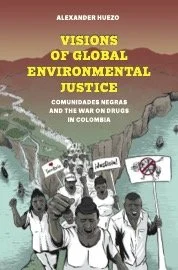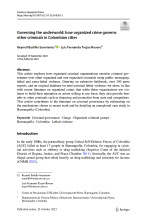By Camilo Pardo-Herrera
The environment is under increasing pressure from global economic dynamics and the constantly increasing demand for raw materials. In this context, environmental crimes in general, and illegal mining in particular, play a key role as they disregard any consideration for sustainable resource extraction. In the Amazon region, one of the most vital ecosystems around the world, illegal gold mining has been identified as the most critical threat to the sustainability of the life of its ecosystems. There is evidence of large quantities of illegal mining production both in Colombia (two-thirds of all production) and Peru (25 to 30 percent of all production). However, since gold is extremely valuable, and portable, it stores value —even under extreme market conditions—, it can be reshaped in any way thinkable, and is not intrinsically illegal, introducing illicitly extracted gold into official supply chains is fairly easy. Once introduced, it flows freely through national, regional, and global markets, and its proceeds do so through the international financial system. It is estimated that illegal mining accounts for up to USD 48 billion a year in criminal proceeds.1 In this context, organized crime associated with the illegal extraction of gold in the Amazon continues to grow in number, size, and scope in response to the insatiable global demand, and thanks to the possibility of laundering and reinvesting their proceeds through illicit financial flows. Thus, an efficient response to the challenges posed by illegal gold mining should be comprehensive and include not just efforts to curb illegal mining, but also, more importantly, efforts to address the illegal flows of money taking place through the gold trade. Although it only analyzes a small sample of the entire global gold market, this paper provides substantive evidence of the illegal flows of money through the gold trade from Peru and Colombia into the United States. While this report is in no position to assert the commission of crimes —since it is only analyzing data— it presents enough evidence to identify points of entry for further criminal investigations and potential judicial action. There is evidence of companies smuggling gold from Venezuela into Colombia, which is then exported to the United States. Between 2010 and 2021, a total of 68,2 tons of gold worth a total of 2.6 billion US dollars, were smuggled through the border in vicinities of Cucuta. Three companies, one in Colombia (CIJ Gutierrez) and two in the United States (Asahi Refining USA Inc., and Johnson Matthey Inc.) concentrate over 90 percent of this trade. Gold trade through this route stopped after 2018 when an Executive Order was signed targeting all parties involved in the trade of Venezuelan gold. There is also evidence of gold and mercury smuggling along the border between Peru and Bolivia and illegal gold production shifting geographies after policy decisions are made. Data show an inexplicable spike in Bolivian gold export in 2014 —with no increases in production— which coincides both, with a ban on mercury by Peru, and a decrease in Peruvian production and exports. This suggests the shifting of illegal mining from Peru into Bolivia, and also of gold smuggling in the same direction. There are clear indications of mis-invoicing of gold trade between these three countries. Peruvian data show significantly higher weight values than those reported at US destinations between 2016 and 2018. A very similar pattern can be seen in Peruvian total exports to the world. Concurrently, trade data show that 29 percent of all shipments from Peru to the US were priced at 70 percent or less than the actual international price during that same time. Although available data does not permit us to assert whether it is a case of overstating the weight of the gold or undervaluing its value, the temporal coincidence of weight and value discrepancies allows us to suggest a general case of mis-invoicing during this time. Colombian data also suggests potential cases of mis-invoicing. Between 2015 and 2016, US statistics reported weight about 50% above those reported by Colombian customs. Price data show that in nine percent of the shipments —approximately 16 tons— gold was paid at 70 percent or less of the global gold price at the time of the transaction. Only a handful of businesses on both sides of the transactions explain most of this trade and are identified — 85 percent of the undervalued shipments are executed by five Colombian firms, and six businesses on the US side concentrate 86 percent of undervalued purchases. Trade in overpriced gold is also identified. Data analysis suggests irregular patterns in the rate between net and gross weights, which could respond to fraudulent reporting and concurrent illicit flows of value. For example, while most shipments use 0.2 grams (or less) of packaging per every gram of gold sent, an important percentage report uses three and up to five times that weight. Of these irregular shipments, over 90 percent were sent by one company in Colombia —Metales Procesados Industriales— to two businesses in the US —Atomic Gold Inc., and United Precious Metal Refining Inc. The analysis also raises warnings as to how certain reports are made. This is the case of the volume of shipments reported by Colombian customs, which is not the result of a measurement, but of an estimation using the net weight of the shipment. Instead of measuring the volume of each shipment, this field is populated using the density of gold, which is a constant, derived from the net weight of the shipment. Although not the result of fraud, but a standard procedure, this hinders transparency and the possibility of monitoring the trade between Colombia and the US. There is evidence of a trend to create shell companies to engage in the trade in gold; presumably of illegal gold. Peruvian tax data shows large numbers of companies participating in the trade in a very sporadic fashion, which contradicts stable and long-lasting trade relationships usual in the international gold market. These companies have a very short legal life, and concentrate all of their commercial activity within a few months, only to cease to exist shortly after. Between 2016 and 2021, these companies traded gold for a total of 230 million USD.
The Terrorism, Transnational Crime and Corruption Center. George Mason University. Arlington, Va. 2022. 34p.

















